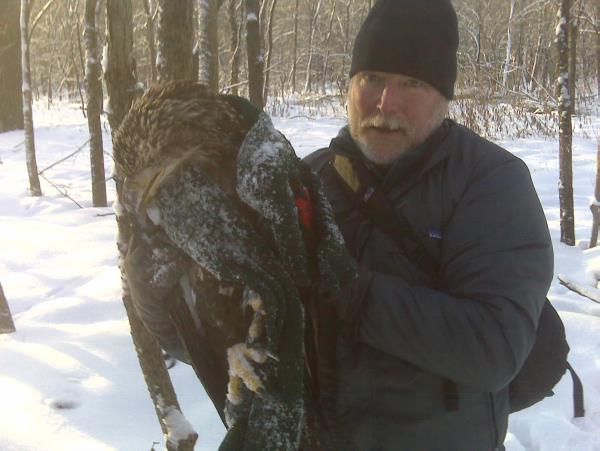
|
| BLUE LINES: The Logging of Morris Island A photomural. Sierra Arts, Reno. March 2020 |
|
In January 2010, a fire-fighter friend and I went to hike in a Black Hawk Park on the Cedar River in Northeast Iowa. We immediately knew something was wrong. Just beyond a roadblock at the parking area were stacks of freshly logged trees and chainsaw sounds coming from the riparian. We ignored the barrier and followed heavy equipment tracks into the woods where we encountered a Bulldozer dragging a huge tree trunk. We broke into an unnatural clearing and saw that what was once one of the most beautiful corners of the county, was now a devastated logging unit. The Bulldozer driver must have reported us because very shortly a ranger hiked out to engage us. He intended to escort us out of there but not before we had a spirited conversation. As a former wild-land fire fighter and wilderness user, I had to make some adjustments for living in Iowa. There is very little public land and zero legally defined wilderness. This site that was logged was one of two tiny wild-lands I was able to find and frequent in our county. Just a month before the logging, I had caught a lead poisoned Bald Eagle in my bare hands and hiked it out of the same riparian. Iowa has an uneasy relationship with anything wild. In addition to five seasons fighting forest fires, I had done a range of forestry work in slash management, cone harvesting, and tree planting. I worked on several national forests throughout the west coast and I had seen different forest management practices. Yet, I had never seen logging like it was practiced in Iowa. The logger falls a deciduous hardwood tree, crops it at the first crotch and then drags the trunk away leaving the entire intact canopy lying where it fell. This practice is appalling to me. It is unsightly and undignified. The fact that the logged wild-land was in a designated county park made the devastation more egregious. A large number of mature Cottonwood trees were logged for "palette wood." A group of us hiked into the unit soon after the logging and were distressed to see beloved old-growth Silver Maples damaged and dead raccoons in the bank of the frozen Cedar River.. The logged riparian was spoiled for me and I started hiking deeper into the woods to Morris Island. A year later, I hiked in to see vehicle tracks in the snow leading in that direction. I called the director of the Conservation Board on the phone and he confirmed that Morris Island had been bid out for logging. I hung up on him. What followed was one of the most personally painful periods of my adult life. Along with a former state legislator, Bill Witt, we began a public protest to halt logging on Morris Island. In the heat of the public controversy, I was told the ranger I encountered at the previous logging was broadcasting to the community that I should have been tasered. Thankfully, my fire-fighter friend was present so it was not my word against the ranger's. I reported this to a Conservation Board member who set up a tense telephone conversation with the director who confirmed the rumor. Later, the same ranger told me, unreasonably, that I could have been arrested. Things got heated. I was being contacted by news media. I did not really know what to call myself and, after all my forestry work, I mistakenly said I was a forester. I'm embarrassed to admit that I did not understand the meaning of that title. My degree is in studio art, not forest science. Yet, the night I realized my mistake, I contacted the newspaper, the Board of Supervisors, and the Conservation Board and blew the whistle on myself. Not only was this the ethical thing to do, I knew that if I did not get out in front of it, it would be weaponized to discredit the protest. That was a depressing night. If our relationship with the Conservation Board was raw and adversarial, the County Board of Supervisors was always respectful as the protest continued. Bill Witt discovered a 1901 Iowa Supreme Court ruling that challenged the county's authority to commercially log public land. We had enough friends in the legislature to get two State Senators and two State Assembly members to request a formal opinion from our State Attorney General, Tom Miller. The opinion was inconclusive leaning towards unfavorable. Not being willing to finance a continued legal battle, we knew we lost. Early that autumn, I hiked into Morris Island and photographed every tree I could find that had been marked with a blue spray-paint line on its trunk. The winter day after the logging concluded, I hiked in to photograph the aftermath. |